- Getting around Lijiang. Dont stay in the Old Towns more than 2 days, there is nothing to do. KRISS Oct 9, 2013 05:46
- 2013 Beijing Temple Fair BENNYLAU Feb 26, 2013 03:29
- Malaysian traveling from KUL - LAX vis Shanghai PVG ZATI_DY Jan 3, 2013 20:15
<a>Jinghong: A Border Town to Dai For
- Views: 7616
- |Vote: 0 0
- |Add to Favorites
- |Recommend to Friends
The Twelve Rice-Growing Districts
Xishuangbanna, like many border prefectures in China, is not a traditionally Chinese place. Its name is a transliteration of the Thai name Sipsongpanna, which means, "land of the twelve rice-growing districts.” Judging by the moist rice paddies in every valley, the place was aptly named. The Chinese annexed Xishuangbanna in 1899 and allowed the Dai people to continue governing themselves until 1953, when the last Dai king abdicated the throne. The People’s Republic then established the Xishuangbanna Dai Autonomous Prefecture, with the small, vibrant town of Jinghong as the county seat.
The Dai people are more closely related to Thai people than to the Chinese. Their dark skin and small stature are typical of China’s southern neighbors. The Dai, a northern Thai people, were engulfed when China expanded its territorial boundaries in the 20th century. This beautiful people has marketed its culture well, and Xishuangbanna has become a famous tourist region in China. The Mekong valley’s natural beauty and the famous Dai singing, dancing and festivals draw visitors from across the nation and around the world. As a result, the Dai have one of the most stable economies of any minority group in China.
To make the most of a visit to Xishuangbanna, make sure to get out into the Dai and Akha villages in the countryside surrounding Jinghong. In 2005, I backpacked through a number of Dai villages in Ganlanba, a small town east of the city. Around lunchtime one day, my friend and I convinced a busy Dai woman to cook us a traditional Dai feast. Her son invited us into their home and gave us pineapple, watermelon and access to the TV while we waited for lunch to get started. With the feast boiling on the stove, her son and his friend showed us around the village. For two and a half hours we were part of the family, enough so that the father came home to eat and treated us to some home-brewed white liquor which I conveniently (though not intentionally) spilled after the first sip.
Last summer I returned for a week in Jinghong, an ideal base-camp for an expedition into the villages, and a great destination in its own right. Jinghong is a small city by Chinese standards, with a population of only about 100,000 in town. The entire metropolitan area is home to over 360,000 inhabitants, most of whom live in the villages and commute by bike, bus, or motorcycle. Palm trees line many of the city streets, and the laid-back, southeast Asian atmosphere is a welcome departure from the rush of a normal Chinese city. Last summer I returned to Jinghong for a week, during which I explored the city by foot and other villages by bike. This article is your guide to a tourist-friendly town that allows you to experience a stockpile of cultural diversity while going easy on your wallet.
Lodging
It’s easy to find inexpensive lodging in Jinghong. Hostels like the Wanli Dai-Style Guest House on Manting Lu and the Banna hotel on Galan Nanlu are cheap, accessible places to hang your hat. You may have trouble like I did convincing the taxi driver that these establishments offer beds and not just food, but once you find the place, you’ll find rooms with four dorm-style beds for about 20 yuan (about $2.50 USD) per person.
Of course, if you’re not a backpacker, you might be looking for something a little more upscale. Jinghong has many da jiu dians, but I didn’t get to stay in any of them. I did, however, make the Lu Qiao (“green bridge” in English) hotel on Xuanwei Lu my home for the entire week. This mid-size retreat offers reasonable rates for quality rooms. Aside from the breakfast buffet and the lobby area, I saw little disparity in quality between the Lu Qiao and the Sino-Swiss in Beijing. Both had western toilets in the rooms and showers and furniture of comparable quality. But Lu Qiao costs a fraction of the price, running about $40 USD per night. Just outside the entrance to the hotel, there’s a fun beauty shop run by some very amiable ladies. Visit them and get a cheap xi tous (head washing/massage) or haircut. If you do, you'll have instant friends.
Food
If your taste buds are used to beifan, food from northern China popularized in the U.S., then you’re in for a spicy surprise. The Dai are never shy about serving their fiery dishes, which are most often anchored by their staple foods: fish, rice, and bamboo, with watermelons for dessert. Dai restaurants mostly stay outside of downtown, but you can find them just across the new bridge east of the city or on Nonglin Nanlu near the entrance to Gasa Middle School. Dai restaurants can be daunting for foreigners, but this is your chance to be adventurous without breaking the bank. Allow a Chinese or Dai person to order for you, and you might be pleasantly surprised. If you happen to eat congealed chicken blood, a chicken head or pig jowls, like I did, chalk it up to cultural experience and move back toward the center of town.
A convenient, hip place to cleanse your taste buds is Mei Mei Café, a popular joint for backpackers and tourists of all nationalities located next to the You Qi bicycle shop on Jingde Lu. If you’re looking to buddy up with a hiking or biking partner from another country, this is your place. Most of the waitresses at Mei Mei’s can speak good English, and the American dishes—pizza, coke floats, and french fries, among others—taste as authentic as it gets in China. An upstairs lounge provides a place for groups to kick back and watch movies, and the chilled-out atmosphere is worth the few extra kuai you pay per meal. A good way to save money is to buy bottled drinks at one of the shops nearby and carry them in.
If you’re looking for a sit-down meal with a more posh atmosphere, try Luo Luo’s, located in the town square across the alley from Dico’s. While Dico’s, a crossbreed of McDonald’s and KFC, offers piping hot chicken and cheap sundaes, Luo Luo’s is the only place in town to get a steak. Granted, it’s no Outback, but the heavily peppered slice of beef can add variety to a diet plagued with too much rice and chicken.
Other Restaurants worth checking out:
Burmese food court-I’ve never been to Burma, but if I go, I hope to find food with the same combination of flavor and frugality. The Burmese district is a little harder to find, nestled in an alleyway between the Da Xin supermarket and the town square. If you can get there, try the restaurant with the posters depicting shaved ice on the walls. You won’t be able to read the menu, but their hongshao niurou (braised beef tips in brown sauce with rice) tasty and filling. And at only 6 yuan ($0.75 USD), you’ll have plenty of money left over for their shaved ice, an addictive dessert topped with sweetened condensed milk and a strawberry or green apple glaze.
Tai Garden Hotel-If you’re looking to go back to beifan, this is your place. I had Sunday lunch there, and the dining room was practically empty. As a hotel, this place is used to treating guests, and it shows in their prompt and polite service.
Crossing the Bridge Noodle Shop-A Jinghong staple, this traditional noodle shop on Jingde Lu near the Minhang intersection has a legendary story of origins. I forgot it, but trust me, it does. Be adventurous here, but know that with tradition comes great responsibility. Allow the waitress to show you the correct way to mix the noodles, and don’t order too much. The portions are big, and you want to save room for the fried bing.
Mekong Café-If Luo Luo’s is the place for steak, Mekong Café is the hamburger capital of Xishuangbanna. This is no McDonald’s, so don’t expect to get your food in a jiffy. Spend your waiting time perusing travel guidebooks in the trendy sitting areas. Mekong, located on the second level of a shop on the same street as Wanli Guest House, is like a less-known version of Mei Mei’s.
Activities and Adventures
As mentioned above, the Dai people are central to Xishuangbanna’s success as a tourist region. Here are a few venues where you can experience the traditional culture of the Dai:
Minority dance shows-Although I didn’t go myself, friends that spent their 60 yuan to attend a theatrical dance performance considered their money well-spent.
Dai minority park- The Dai adhere to a combination of Theravada Buddhism and their own traditional religion. They celebrate many festivals, including the famed water-splashing festival, which helps them ring in their new year. This wet-and-wild festival has its roots in Buddhist and animistic beliefs and has drawn large numbers of tourists in recent years. The Dai minority park is supposedly a prime location to join in the aquatic pandemonium. You can find this park in Ganlanba, a 45-minute bus-ride southeast from Jinghong. But make plans to get back to J-town before nightfall. Lodging in a “traditional” Dai home sounds exotic, but the newly built structures are overpriced tourist traps. A small town, Ganlanba doesn’t offer many other suitable lodging options.
Restaurants-Some Dai restaurants, like the one across the new bridge overlooking the river, provide musical entertainment while you eat. But be careful: just when we began to digest our food, they pulled us up on stage and taught us how to dance.
Xishuangbanna Rainforest Park
You’ll be hard-pressed to find a taxi that will take you 20 minutes outside the city to the Xishuangbanna Rainforest Park, but it’s worth renting a vehicle or taking a bus to enjoy this nature preserve. The park allows visitors an up-close encounter with southern Yunnan’s humid climate and hilly terrain without the hassle of tents, machetes and gallons of bug repellent.
The park is divided into three basic levels. Tram drivers offered to take us up the modest incline for 15 kuai (each way). The offer enticed me, but the adventurer and glutton within me conspired to make this solution: I'd expend some calories and keep my 30 kuai to replenish them once we got back to the city (shaved ice, anyone?).
We passed a peacock pen and a beautiful pond where Chinese tourists had gathered to enjoy the weather. When we heard singing we knew we had reached level two. Large crowds had piled into a small amphitheater, which sat within splashing distance of a tall, man-made waterfall. The man on stage wore traditional garb and wailed something into his headset microphone. He entered into a rhythmic chant and his arms flailed wildly as he lit into the huge drums surrounding him, to the delight of the crowd.
Across the street (and back a little) from the theater sat an "authentic" minority village that had two points of entry: a long bridge from the main road, or a zip-line across a wide ravine. The bridge was free. The zip-line cost 15 kuai (almost two U.S. dollars) each way.
To get to the staircase that led to the rainforest trail, we had to walk through trinket shops and a small cafe. The more experienced travelers told the greener ones to obey the Six Flags principle: Everything costs exponentially more at theme parks. And for China, this was a theme park.
Before the rainforest trail began, we found some of the best (or should I say worst) English translations I'd ever seen in China. My personal favorites: "Enter into monkeys, please safekeeping your stuff" and the "tropical rare and extinct plants park."
We crossed over a bamboo bridge reminiscent of an Indiana Jones movie, disobeying the sign that said in English, "No swaying." The trail, a flexible but sturdy path of interwoven bamboo, snaked upward along the sides of the small valley. Along the easy two-hour hike, vendors had set up kiosks (small huts) where you could do anything from archery to having your picture taken with a giant python. I have to say that the rainforest park was the most enjoyable tourist trap I’ve ever visited.
Peacock Lake Park
During the day, American public parks are places where kids play, families relax and athletes practice their sports. After nightfall, though, they become places of infamy you don’t want to visit. In China, it's the exact opposite. Most people don't congregate in parks during the day, but at night, when the neon lights buzz on, the whole family comes out to enjoy the electric nightlife.
Peacock Lake Park sits on the corner of Xuanwei Lu and Minzu Lu. Vendors with headset mics bark advertisements through loud, grainy speakers, beckoning potential buyers to witness the wonders of their products. Crowds gather for music and dancing, and paddleboats skim the top of the small, concrete-enclosed lake. If you’re lucky, you might stumble upon a lively outdoor concert or an intense game of xiang qi, sometimes described as a Chinese version of chess.
Other Noteworthy Activities
Biking-The You Qi bicycle shop can be identified by its yellow sign next to Mei Mei Café. Bikes are about $15 for a half-day, which is ample time to explore the lush valleys west of the city. The owners are friendly and helpful, and they’ll give you a photocopied map to guide your journey. Be prepared but not afraid to give them a hefty wad of money for a deposit. They’ll give it back when you return their bikes.
Foot Massage-Go to the outdoor mall between Dico’s and Luo Luo’s and look for a huge neon sign with giant footprints. There you’ll find Zu Sheng Tang, a ritzy little date venue where you get an iced coffee along with your foot massage. For 50 yuan, the attendants will give you and a significant other a private room with a TV, a remote control and air conditioning. Then they’ll use their magic hands to rub you down for well over an hour. Try getting the same treatment in the U.S. for $6.50. It’ll never happen.
If you have a hankering for more intensive massage, try the blind man’s massage school on Jinghong Nanlu.
Shopping-Innumerable shops line Jinghong Nanlu, which runs under the old gate in the center of town. You can buy anything, from wooden elephants to vibrantly colored minority clothing tailored just for you. Come with a budget, and get ready for some haggling.
Transportation
Taxi-The standard fare around the city is five yuan to any destination. If you’re a real penny-pincher and you want to experience something different, take a motorcycle carriage. They usually wait outside the Da Xing supermarket on Jinghong Nanlu and charge three yuan. To the airport, which is five kilometers outside the city, don’t pay more than 40 yuan, and always be sure to negotiate the price before you start moving. No one uses a meter in Jinghong, so don’t let them rip you off just because you’re a foreigner.
Bus-The No.2 bus station is the way to get to villages around Xishuangbanna. You can always hitch-hike if you want, but this is the place to get paper tickets.
Plane-If Jinghong is your final destination, you might want to try flying in from Thailand. A lot of times, you can find cheap deals to Bangkok. From there you can hop to Chiang Mai and then cross the border in a small jet. Two reasons I advocate approaching Jinghong by plane: The aerial view of the manicured hills in the country is breathtaking, and the bus takes at least 10 hours from Kunming. As they say, time is money, and it’s worth yours to be sipping a shake at Mei Mei’s in Jinghong rather than languishing all day on a dusty, winding road.
There’s so much more that I haven’t even mentioned, but this is enough to kickstart your stay in the city whose name means “City of Dawn” in Dai language. Jinghong has a special place in my heart, and if you follow these suggestions, it’s sure to capture yours as well.



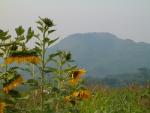
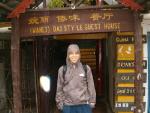
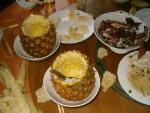
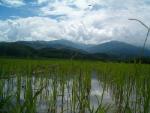
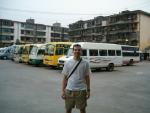
 Copyright © 1998-2026 All rights reserved.
Copyright © 1998-2026 All rights reserved.
1.
Mar 10, 2013 03:59 Reply
Mr.BAKSI from malaysia said:
I cannot find any flight from Thailand to xishuangbanna. Most info are outdated. Anyone know what the latest flight, if any? Year 2013.